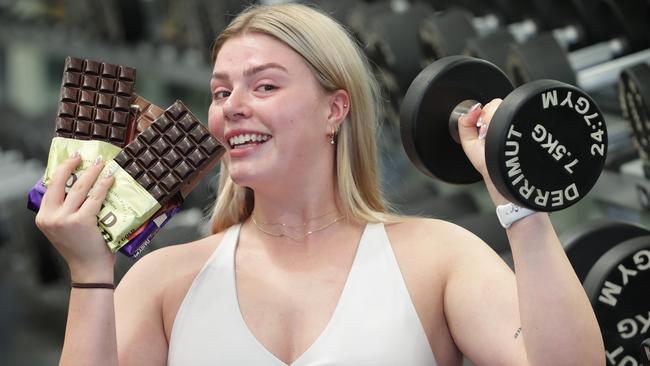How losing weight may help save you from knee replacement surgery in the future
Creeping weight gain is damaging our health and knees but the solution to keeping off extra kilos may be simpler than you think.
News
Don't miss out on the headlines from News. Followed categories will be added to My News.
Victorians are gaining small, insidious amounts of weight every year in what has been described as a relentless and costly kilo creep.
New research from Monash University has found that many adults put on around 1kg a year which is putting a strain not only on the health budget, but also on knees.
The good news is that the solution may be as simple as eating two fewer pieces of chocolate per week, or adding 10 minutes of exercise. This, say public health experts from Monash University, can help prevent the 1kg weight gain per person per year in Australia.
Flavia Cicuttini, who heads Monash University’s School of Public Health and Preventive Medicine’s Musculoskeletal Epidemiology Unit, says that if more people maintained their weight and shifted down a weight category it could help save around $373 million a year in total knee replacement surgery and prevent the surgery by 28.4 per cent.

Professor Cicuttini led the team who used the data of more than 24,000 Victorians from the Melbourne Collaborative Cohort Study. Her research showed that preventing weight gain from young adulthood to late midlife can help Australia’s burgeoning overweight and obesity crisis.
All it would take, she says, is for people to shift down a weight category: for example from obese to overweight, from overweight to normal and then focus on maintaining that weight.
“Reducing your caloric intake just slightly each day builds up to avoiding 8-12 kg of weight gain over a couple of decades, saving money and avoiding surgery. This also has cardiac and other health benefits,” she says.
“This can result in tangible health gains, improving lives and saving money.”
Professor Cicuttini said a “call to action” was needed for knee joint health.
“We also need to be sending out the message that it is important to make sure that people don’t continue to gain more weight,” she said.
“Although recommendations to lose weight are important if a person is carrying excess weight, this can be difficult to achieve for most people.”
Professor Cicuttini also says ‘Covid kilos’ is a bit of a red herring because it has been known for decades that people in Australia and the US are slowly accumulating weight.
“It is not like people wake up one day and they have gained 10kg. People slowly transition from normal, to overweight to obese,” Professor Cicuttini says.

“Everybody knows that being obese and not exercising is bad for your health; there is nothing new in that but the World Health Organisation says the way to manage obesity is to prevent weight gain, maintain and lose weight. Here we tend to focus only on losing weight.”
She says goals need to be more achievable. “People almost give up and continue to gain weight. We are always chasing our tail. We probably should be giving people more advice that yes you should be losing weight, but whatever you do don’t gain any more weight. This is an achievable goal.
“We tend to believe that telling people to lose weight is important and has no down side, but focusing on weight loss can have negative effects on a person, especially if they have already tried and failed.”
The study found that those who are obese are at a tenfold increased risk of needing a knee replacement surgery, but it also highlighted the surgery is more common in those who are borderline obese, a group Professor Cicuttini says often goes under the radar.
Professor Cicuttini says that assuming we can ‘fix’ obesity after it has occurred is not very effective and prevention has multiple health and cost benefits.
The results of the study have just been published in the journal Osteoarthritis and Cartilage.




